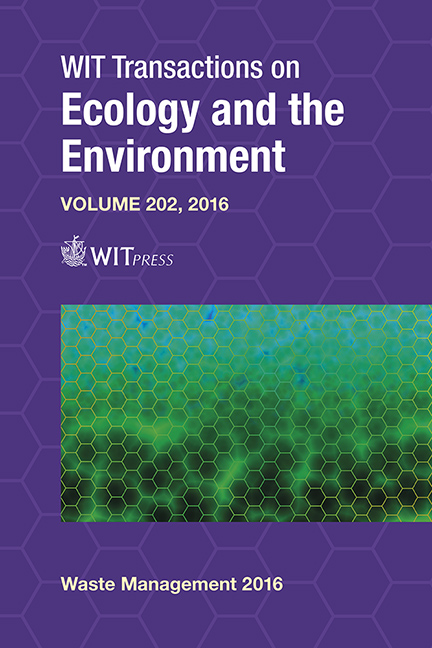The Impact Of Health Services’ Waste To Public Health And To The Environment
Price
Free (open access)
Transaction
Volume
202
Pages
10
Page Range
255 - 264
Published
2016
Size
595 kb
Paper DOI
10.2495/WM160231
Copyright
WIT Press
Author(s)
H. M. P. Ramos, V. R. N. Cruvinel, D. Galato
Abstract
The risks caused by the disposal of healthcare waste have gained great importance for the scientific community, for when discarded inadequately the waste represent potential risks for both public health and the environment. In this context it is worth noting the risks conferred to the health of scavenging workers, public health and the environment. Studies show that disposal of medicine into the common garbage or the sewage contaminates the soil and water resources. The present work aims to analyze the risks of selective collection pickers to the residues of healthcare waste and the risks that these represent for public health and the environment. This is a cross-sectional descriptive study with a quantitative approach. Interviews were conducted through a questionnaire applied to 61 workers of the Pre-Cooperative Associations of Collectors of Solid Waste and Recycle Life. The collected data has been tabulated and analyzed in a descriptive form. The results of this study show a prevalence of 51.0% of women working in associations; 36.0% of respondents aged between 30 and 39, 42.6% have worked for over 10 years in the occupation of collector and 81.0% make use of personal protective equipment. Of the respondents, 23.0% had experienced some kind of accident with healthcare waste; 95.1% say they often find drugs in the workplace and 86.9% of these are medical waste. It concludes that workers are exposed to risks due to the improper disposal of waste from healthcare services. Therefore, it is necessary to strengthen strategies to raise awareness about the proper disposal of medicines and medical waste and incorporate existing laws into the management of such waste produced in households.
Keywords
medical waste, occupational health, sewers collectors, environmental health





